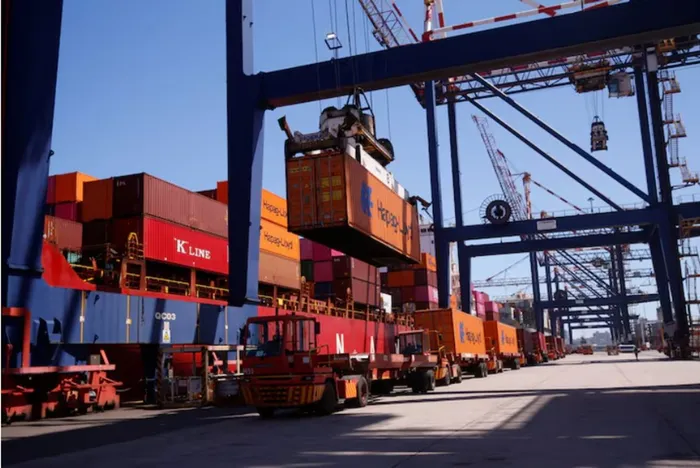Navigating the challenges: Global supply chains and trade in turmoil

Trucks deliver containers to be loaded onto a ship at the port in Durban, South Africa. Complex supply chains stretch around the world, says the author.
Image: Reuters
The world is different now and that’s quite a thing. I don’t know how I feel about it.It’s been far from perfect but much of the growth the world has seen in the last 80 years has been an outcome of more trade.
Not all of it of course, and much of the gains have been quite unevenly spread, but it’s hard to imagine a world where globalisation did not happen and feel ok about it. There are around 7.2 billion smartphones in the world and not one of them is less powerful than the computer that sent the first people to the moon. Now think of the amazing things almost every human on earth takes for granted by simply having a smartphone. This device has altered humanity, and it would not be possible without complex supply chains stretching around the world. No one country on earth can build a smartphone.
Wars between countries became rare, although not rare enough, at least in part because wars are bad for businesses who are spread around the globe. The humble shipping container, invented by Malcolm McLean in 1956, made moving things around the world easier and cheaper and so more things were moved.
In 1995 the World Trade Organisation (WTO) came into existence, further driving down barriers to trade and then 2001. China joined and again the world was changed forever. China’s economy exploded, largely on the back of supplying America with cheap everything in enormous volumes, freeing up huge amounts of household capital, driving America’s enormous consumer economy, and pushing China to the world’s second largest economy. The US accounts for 25% of the world’s GDP, but China contributes around 30% of the world’s manufacturing added value.
January 20, 2025. President Donald Trump assumed office and by February 1 US President Trump announced and signed executive orders imposing 25% tariffs on most imports from Canada and Mexico. The first shots had been fired in the Great Trade War, and those shots had been fired at America’s largest trading partners. It is hard to overstate the implications of such an assault, followed rapidly by Liberation Day tariffs on April 4 and everything that has since followed.
America has been the most important economy in the world since the end of World War 2, and while that status remains for now, it is very difficult to see how the broken relationships can be mended even over the medium term.
Groups like the G20 have never been more important, representing over 85% of global GDP, 75% of international trade, and two-thirds of the world's population, according to the South African Institute of International Affairs.
While the United States tries to “Brexit” from the rest of the world, the rest of the world is frantically trying to find new trading partners, a considerably harder problem than ever anticipated and besides, whoever would have anticipated 2025?
It is not well known that the US taxpayer has funded the protection of global shipping for decades now, dramatically lowering the cost of moving goods around the world. And not just their own cargo. When the Houthis in Yemen began firing rockets at ships sailing through the Red Sea, it was a coalition led by the United States and supported by 20 other states, mainly from Europe, that took action to protect these ships.
The countries in Asia, most affected by these attacks were not part of this consortium. If each country needs to begin protecting its own cargo, you can quickly see how shipping costs will escalate, and the countries which will take the hardest hit are the small economies, almost of all of which are highly dependent on trade. Freight insurance will skyrocket, with some routes quickly becoming uninsurable.
The world is now awash in tariffs from America, forcing products destined for the US to find new markets. Those markets will have incumbent competitors, some homegrown and others imported, but the arrival of new entrants will not be universally met with open arms, especially if those new arrivals are undercutting their local competitors.
Tariff protection will be raised elsewhere, and just like that the world will grow large again. Everyone will be a little further from everyone else and global trade will be more expensive. But this too will pass, even if its passing is like a kidney stone. Trade will shift to new partners and more will happen with some old, because everyone in the world wants nice things and can’t have them without trading with each other.

Donald MacKay is founder and chief executive of XA Global Trade Advisors.
Image: Supplied
Donald MacKay is founder and chief executive of XA Global Trade Advisors. MacKay has been advising local and foreign companies on global trade issues for more than two decades. X handle: XA_advisors; email: donald@ xagta.com; website: xagta.com.
***The views in this column are independent of IOL and Independent Media.
BUSINESS REPORT
Related Topics: